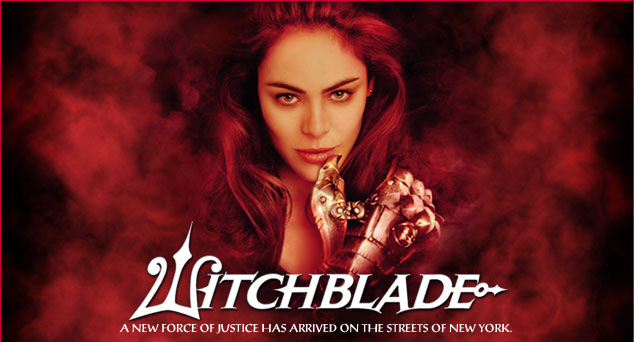 ★★★½
★★★½
“Witch watch.”
The summer season of TV is usually characterised by repeats and re-runs, with little to stimulate interest beyond speculation over the fall schedule. This year, however, a dark horse emerged, from the surprising source of TNT, with their adaptation of Top Cow’s Witchblade series, with Yancy Butler in the title role. Over thirteen hours of episodes, including the two-hour pilot, it chronicled the adventures of Sara Pezzini, a New York detective who acquires a bracelet with remarkable powers, not the least of which is its ability to transform into an industrial-strength sword. This brings her into conflict with people like mysterious power-broker Kenneth Irons, and her own captain. She loses partners, lovers and friends on the way to what is unfortunately one of the worst twists in any TV series, since Bobby stepped out of the shower in Dallas. Serious spoiler alert for the following, folks, though this may be a good thing, since it’ll let you get your disappointment out of the way early.
 Put simply, having killed of most of the cast (a refreshing change from more cowardly shows, which refuse to let any characters die), our heroine decides she doesn’t like what’s happened, and rewinds time back to just before her partner was killed, way back in the pilot episode. The rest of the season is deemed stricken from the record, and not even Pezzini has any recollection of it. It’s a little like Run Lola Run, except that film actually delivered a beautiful elegy on the role of chance in our affairs, something I suspect Witchblade will not come within a million miles of doing.
Put simply, having killed of most of the cast (a refreshing change from more cowardly shows, which refuse to let any characters die), our heroine decides she doesn’t like what’s happened, and rewinds time back to just before her partner was killed, way back in the pilot episode. The rest of the season is deemed stricken from the record, and not even Pezzini has any recollection of it. It’s a little like Run Lola Run, except that film actually delivered a beautiful elegy on the role of chance in our affairs, something I suspect Witchblade will not come within a million miles of doing.
The main question is where can the show go from here? I can see how they can move the series in another direction now, with her (now-surviving) partner taking on a larger role, but while none of the characters may know anything, the audience’s memory is still intact. We know, for example, that Jake McCarty is an FBI agent, and are aware of the roles of most of the characters and their relationships. Watching the cast rediscover all this again – as they surely must – is going to be like watching a rerun.
However, maybe they can pull it off, since up until that final ten minutes, the writing on the show was actually very impressive. I confess to no familiarity with the comic-book at all – save for a vague awareness of covers featuring improbably-proportioned heroines – and so can’t comment on how accurately it follows them, but on its own merits, it works well. Several overlapping story arcs were contained in the series, but even if you missed some episodes, there was little trouble picking up on them – another mark of good writing. After the pilot, we kinda forgot about the show for two months (it was on TNT, after all!), and only caught up with the ones we’d missed when the channel aired an all-day marathon. There were plenty of potential angles for future exploration – we were particularly intrigued by the Vatican angle exposed by demonic priest Roger Daltrey, where the Catholic church had the Witchblade for centuries before giving it to Hitler.
 About the only angle that didn’t work for us was the love story between Pezzini and Concobar, her Irish bard. Pardon me if we yawn: Irish people are far too often either Guinness-swilling songsters who’ve kissed the Blarney Stone or terrorists, and the series gave us both. Beyond filling in some interesting sidelight on the history of the Witchblade – a concept worthy of a series in itself – there wasn’t much to this beyond Pezzini getting a shag, though even this didn’t seem to improve her humour. Yancy Butler, despite not having much of a pedigree (she’s perhaps best known for playing opposite Jean-Claude Van Damme in John Woo’s American debut, Hard Target), provides a strong central perfomance as Pezzini, striking the right balance between confusion, strength and sarcasm. Could perhaps do with slightly-less use of the sardonic eyebrow though – if she’s not careful, it’ll demand its own spin-off series. She seems to have come on in action terms as the series progressed; early on, the stunt-doubling was painfully obvious, but in later episodes, she appeared to be taking on more of the work herself, which can only be encouraging for the next series.
About the only angle that didn’t work for us was the love story between Pezzini and Concobar, her Irish bard. Pardon me if we yawn: Irish people are far too often either Guinness-swilling songsters who’ve kissed the Blarney Stone or terrorists, and the series gave us both. Beyond filling in some interesting sidelight on the history of the Witchblade – a concept worthy of a series in itself – there wasn’t much to this beyond Pezzini getting a shag, though even this didn’t seem to improve her humour. Yancy Butler, despite not having much of a pedigree (she’s perhaps best known for playing opposite Jean-Claude Van Damme in John Woo’s American debut, Hard Target), provides a strong central perfomance as Pezzini, striking the right balance between confusion, strength and sarcasm. Could perhaps do with slightly-less use of the sardonic eyebrow though – if she’s not careful, it’ll demand its own spin-off series. She seems to have come on in action terms as the series progressed; early on, the stunt-doubling was painfully obvious, but in later episodes, she appeared to be taking on more of the work herself, which can only be encouraging for the next series.
Most of the subsidiary characters come across as well-rounded, even the likes of Ian Nottingham, Irons’ enforcer, who gradually falls in love with Pezzini and reveals a softer side. This is in sharp contrast to his replacement – Nottingham v2.0, or Nottingham ME, as we call him – who was simply Very Scary. Her first partner, Will, although dead from the pilot on, continued to appear in a nicely-handled fashion, with mostly only Pezzini able to see him. Oddly though, he makes his presence known to McCarty when it proves suitably dramatic, without any explanation of why he can suddenly do so. Maybe it’s normally too straining on his ectoplasm or something. If it wasn’t for the climax, the show would certainly have deserved our Seal of Approval. As it is, any such award is placed on hold pending future episodes, and we see how they resolve the problems posed by the ending of this year’s batch.
Star: Yancy Butler, Anthony Cistaro, David Chokachi, Eric Etebari





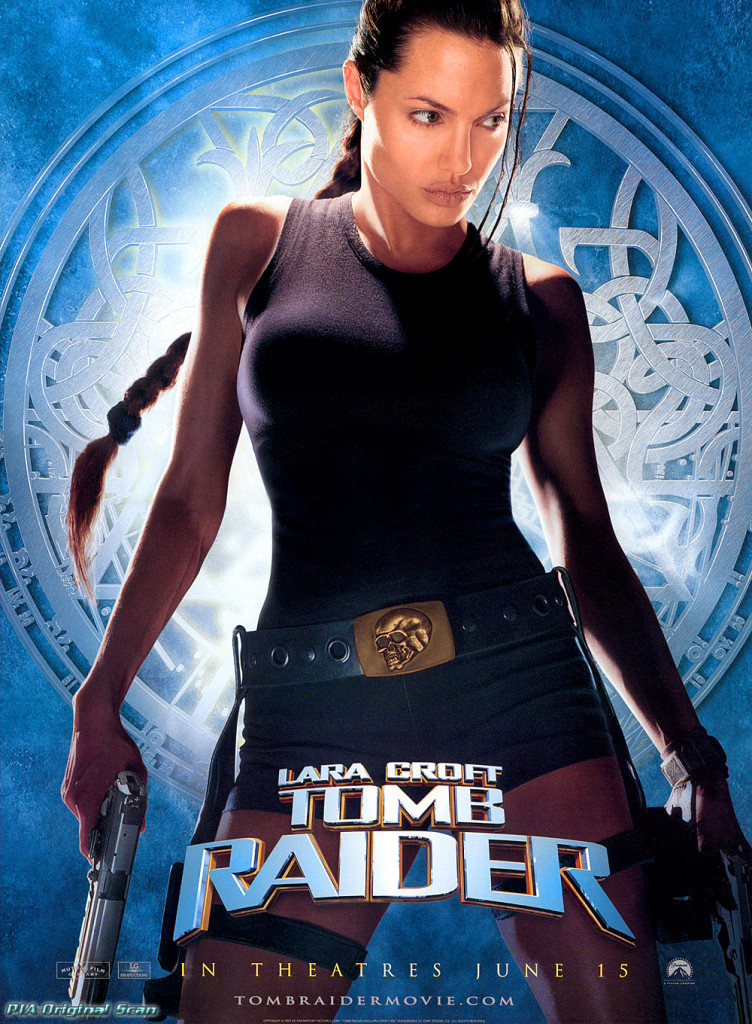
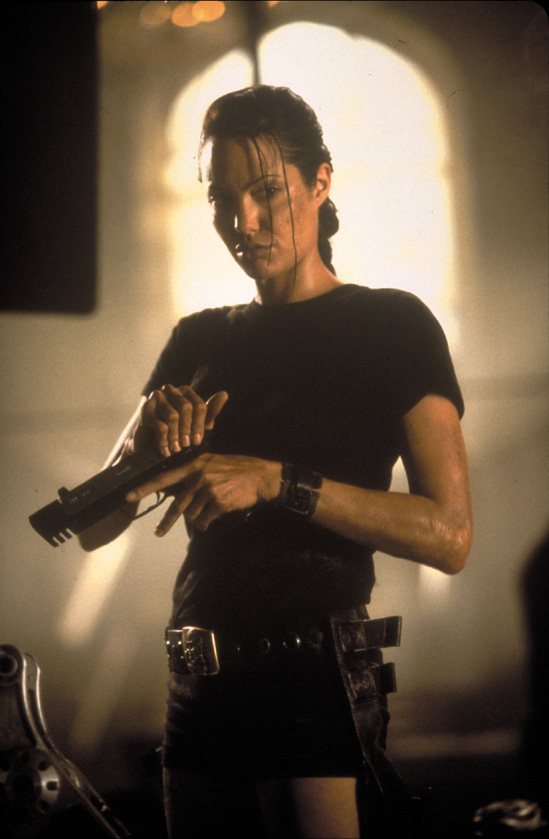












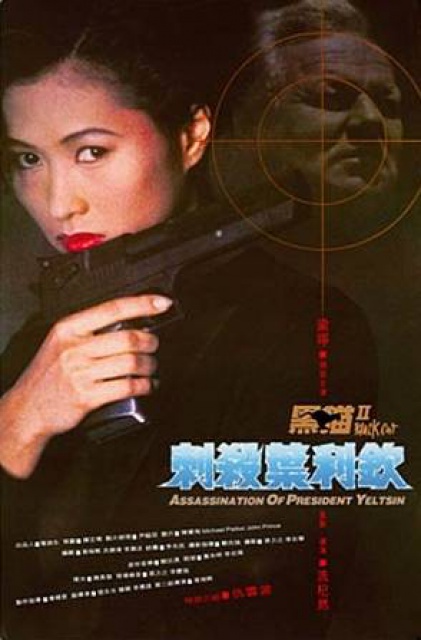
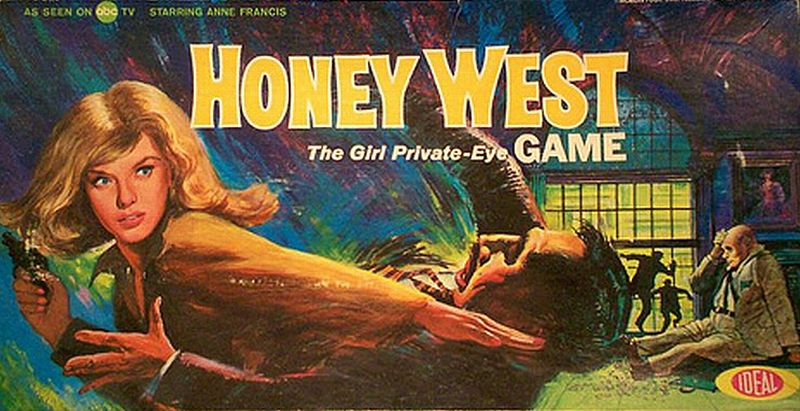 ★★★★
★★★★
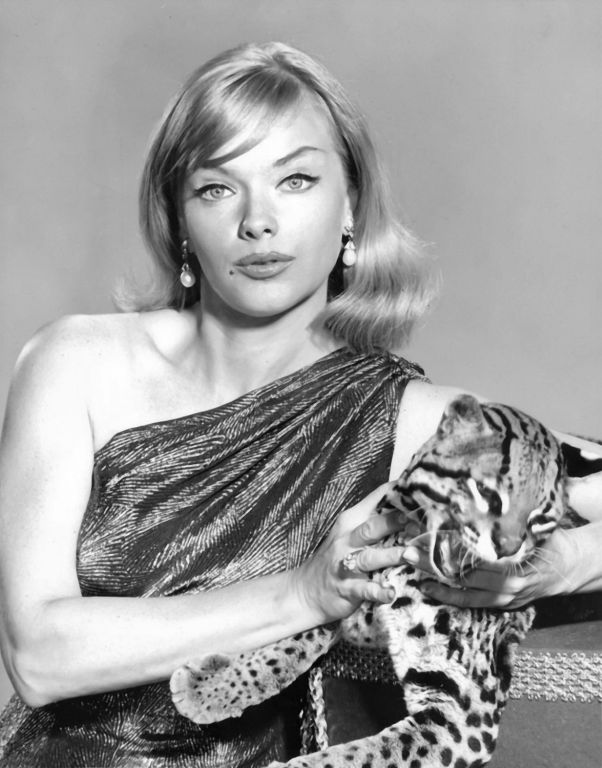 Honey West’s significance in television history can’t be exaggerated. She was the first ever woman detective to be the central character in an American network series, and was arguably the medium’s first action-heroine. Even though it ran for just one season, it helped open the doors for those who followed, such as The Girl from U.N.C.L.E., Get Christie Love and Police Woman. The show was based on a series of books by husband-and-wife team Gloria and Forrest Fickling, writing as “G.G.Fickling”. Beginning in 1957 with This Girl For Hire, eleven novels were produced over the next half-decade, and noted producer Aaron Spelling bought the rights and turned it into a TV series, originally spinning off from Burke’s Law [Gloria Fickling states they were largely screwed over by Spelling, getting little beyond a credit].
Honey West’s significance in television history can’t be exaggerated. She was the first ever woman detective to be the central character in an American network series, and was arguably the medium’s first action-heroine. Even though it ran for just one season, it helped open the doors for those who followed, such as The Girl from U.N.C.L.E., Get Christie Love and Police Woman. The show was based on a series of books by husband-and-wife team Gloria and Forrest Fickling, writing as “G.G.Fickling”. Beginning in 1957 with This Girl For Hire, eleven novels were produced over the next half-decade, and noted producer Aaron Spelling bought the rights and turned it into a TV series, originally spinning off from Burke’s Law [Gloria Fickling states they were largely screwed over by Spelling, getting little beyond a credit].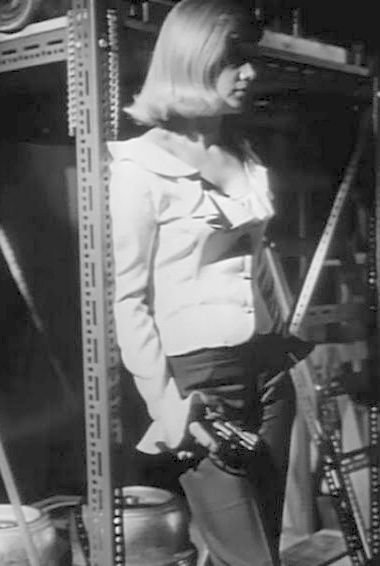 We also appreciated the parade of supporting actors, which include a significant number of familiar names, especially if you watch other shows from the era. Other names should be recognized regardless, including Kevin McCarthy, Michael J. Pollard, Richard Kiel, Joe Don Baker and Dick Clark. The music, by Joseph Mullendore, is an appropriate blast from the past, resulting in much snapping of fingers and shaking of shoulders from the GWG couch by myself and Chris. Indeed, Chris even came up with her own set of lyrics for the theme-tune, which you can find in the sidebar; we were singing lustily along with the opening credits, to the utter bemusement of our son. [The middle section is a bit tricky, and should probably only be attempted by trained professionals. We ended up going, “Raindrops on roses, and whiskers on kittens…” much of the time!]
We also appreciated the parade of supporting actors, which include a significant number of familiar names, especially if you watch other shows from the era. Other names should be recognized regardless, including Kevin McCarthy, Michael J. Pollard, Richard Kiel, Joe Don Baker and Dick Clark. The music, by Joseph Mullendore, is an appropriate blast from the past, resulting in much snapping of fingers and shaking of shoulders from the GWG couch by myself and Chris. Indeed, Chris even came up with her own set of lyrics for the theme-tune, which you can find in the sidebar; we were singing lustily along with the opening credits, to the utter bemusement of our son. [The middle section is a bit tricky, and should probably only be attempted by trained professionals. We ended up going, “Raindrops on roses, and whiskers on kittens…” much of the time!]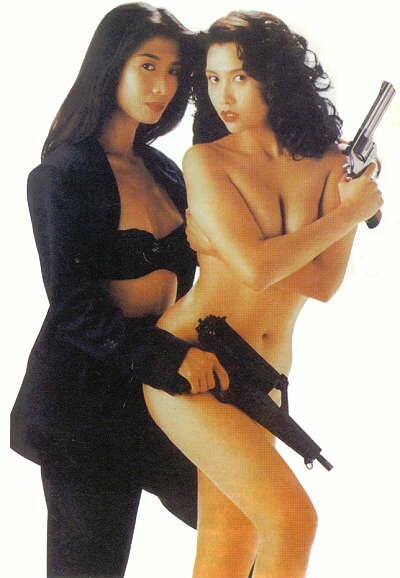
 Ng, in particular, nails her part with a relish that’s just fabulous, but Kelly Yao also does surprisingly well – her role is perhaps the most pivotal in the plot, and she’s required to do more than look pretty, which she does with a maturity and confident poise that borders on the balletic. Yau is about the closest to a sympathetic character the film has, being largely the victim of unfortunate circumstances, while Yam has pretty much made a career out of playing the troubled cop, and could do this kind of job with his eyes shut. Indeed, given the vomiting required, he largely does.
Ng, in particular, nails her part with a relish that’s just fabulous, but Kelly Yao also does surprisingly well – her role is perhaps the most pivotal in the plot, and she’s required to do more than look pretty, which she does with a maturity and confident poise that borders on the balletic. Yau is about the closest to a sympathetic character the film has, being largely the victim of unfortunate circumstances, while Yam has pretty much made a career out of playing the troubled cop, and could do this kind of job with his eyes shut. Indeed, given the vomiting required, he largely does.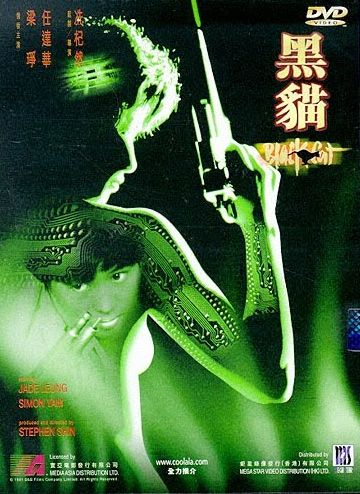
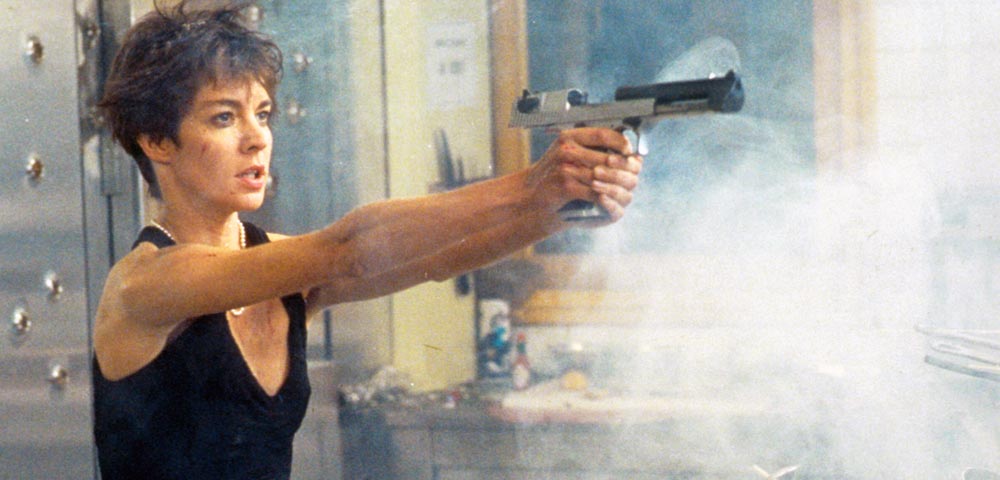
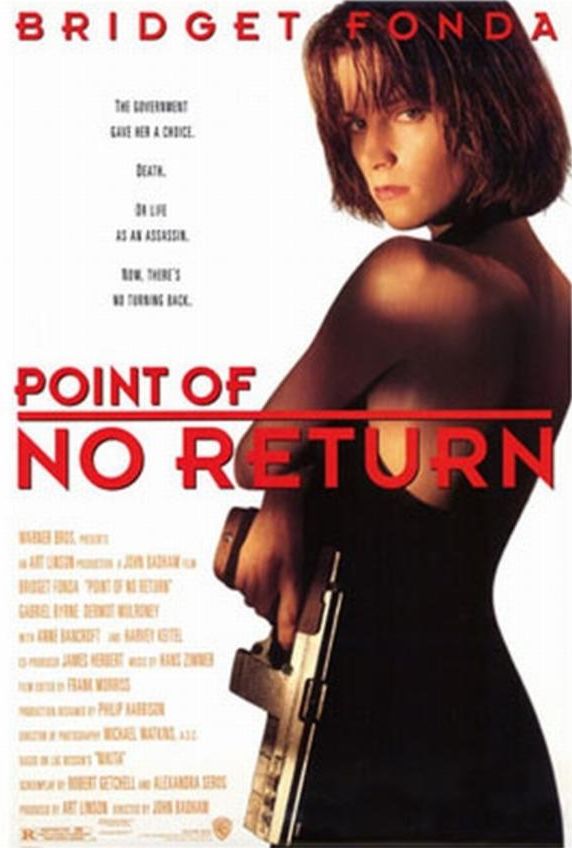
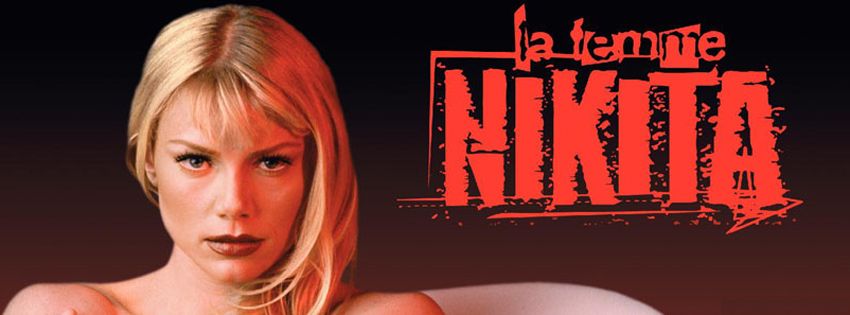 ★★★
★★★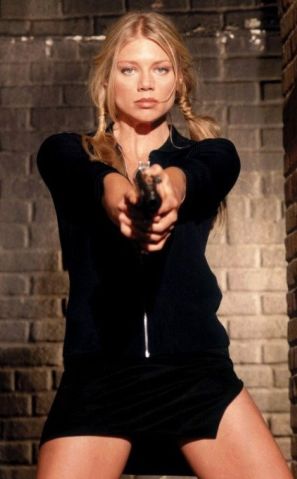 The other chance is that Section One, their version of Division, is not malicious – at least not in the same way. It’s certainly a heartless organization, which is utterly ruthless, and prepared to dispose of anyone who may interfere with their actions, but it’s more an awareness that when you’re dealing with terrorists, organized crime or other threats to the country and world, you can’t be unwilling to get your hands dirty. It leads to a significant bleaker overall tone, and is amazingly prophetic, given this was screened well before 9/11 led to this attitude become a necessary part of national security. Early on, it’s established that you can never trust Section heads Operation (Glazer) and Madeleine (Watson, who was also part of the remake, playing Senator Pierce – her given name there was also Madeleine), to the extent that their deceit becomes almost a cliché.
The other chance is that Section One, their version of Division, is not malicious – at least not in the same way. It’s certainly a heartless organization, which is utterly ruthless, and prepared to dispose of anyone who may interfere with their actions, but it’s more an awareness that when you’re dealing with terrorists, organized crime or other threats to the country and world, you can’t be unwilling to get your hands dirty. It leads to a significant bleaker overall tone, and is amazingly prophetic, given this was screened well before 9/11 led to this attitude become a necessary part of national security. Early on, it’s established that you can never trust Section heads Operation (Glazer) and Madeleine (Watson, who was also part of the remake, playing Senator Pierce – her given name there was also Madeleine), to the extent that their deceit becomes almost a cliché.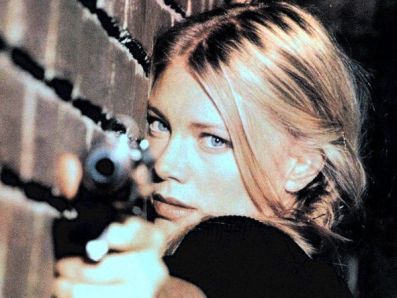 On the other hand, apart from the lack of action, the angle I liked least was the relationship between Nikita and her handler/fellow agent, Michael (Dupuis). I’ll come right out and say it: I hate ‘shippers, and storylines that pander to them are nothing more than an irritant to me, especially in shows which I watch for action, where they do little except interfere with the good stuff, in my humble opinion. [We’ve seen this in the new incarnation, where the show has disintegrated from one of the best shows on TV, into little more than Mr. and Mrs. Smith And Friends.] I’m definitely a “noromo”: If I wanted unresolved sexual tension and relationship nonsense, I’d watch daytime soap operas. Right from the first time Nikita and Michael meet, it’s doe-eyed heaven, even though there is obviously little or no honesty, trust and anything else on which a genuine relationship could ever be founded.
On the other hand, apart from the lack of action, the angle I liked least was the relationship between Nikita and her handler/fellow agent, Michael (Dupuis). I’ll come right out and say it: I hate ‘shippers, and storylines that pander to them are nothing more than an irritant to me, especially in shows which I watch for action, where they do little except interfere with the good stuff, in my humble opinion. [We’ve seen this in the new incarnation, where the show has disintegrated from one of the best shows on TV, into little more than Mr. and Mrs. Smith And Friends.] I’m definitely a “noromo”: If I wanted unresolved sexual tension and relationship nonsense, I’d watch daytime soap operas. Right from the first time Nikita and Michael meet, it’s doe-eyed heaven, even though there is obviously little or no honesty, trust and anything else on which a genuine relationship could ever be founded. ★★★★
★★★★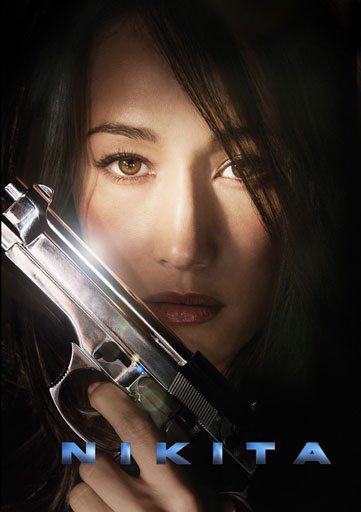 I was reassured by the casting of Maggie Q as the lead, who has a solid action pedigree, both in Hong Kong (Naked Weapon) and the West (Live Free or Die Hard and M-I:3). While its source material was clear, it took a different approach. Instead of telling Nikita’s story from the beginning, with her recruitment into a shadowy semi-official organization and training as an assassin, it starts later, after she has mutinied and left them. Now, she is working to bring down the organization known as Division, its leader, Percy (Berkeley), and his right-hand man, Michael (West), who trained Nikita before she went rogue. Her ‘secret weapon’ is Alex (Fonseca), a new recruit going through training, while acting as Nikita’s mole and feeding her information, allowing her to sabotage and obstruct Division’s missions.
I was reassured by the casting of Maggie Q as the lead, who has a solid action pedigree, both in Hong Kong (Naked Weapon) and the West (Live Free or Die Hard and M-I:3). While its source material was clear, it took a different approach. Instead of telling Nikita’s story from the beginning, with her recruitment into a shadowy semi-official organization and training as an assassin, it starts later, after she has mutinied and left them. Now, she is working to bring down the organization known as Division, its leader, Percy (Berkeley), and his right-hand man, Michael (West), who trained Nikita before she went rogue. Her ‘secret weapon’ is Alex (Fonseca), a new recruit going through training, while acting as Nikita’s mole and feeding her information, allowing her to sabotage and obstruct Division’s missions. They even crammed in nice nods to the original movie and its TV predecessor too, with a dive down a chute to escape, and a cameo from Alberta Watson, one of La Femme Nikita‘s actors, as part of the intelligence committee supposedly in charge of Division. By the time the dust has settled, Nikita was driving off into the sunset with a surprising ally, and Alex was also teamed up in a new way, setting things up nicely for the second series. Whether it was going to get one or not seemed in doubt for a while, as the rating did sag mid-season, dropping the show onto the ‘bubble’. However, it was announced in May that the CW would pick it up for another series, moving the show to Friday nights to play along with Supernatural.
They even crammed in nice nods to the original movie and its TV predecessor too, with a dive down a chute to escape, and a cameo from Alberta Watson, one of La Femme Nikita‘s actors, as part of the intelligence committee supposedly in charge of Division. By the time the dust has settled, Nikita was driving off into the sunset with a surprising ally, and Alex was also teamed up in a new way, setting things up nicely for the second series. Whether it was going to get one or not seemed in doubt for a while, as the rating did sag mid-season, dropping the show onto the ‘bubble’. However, it was announced in May that the CW would pick it up for another series, moving the show to Friday nights to play along with Supernatural.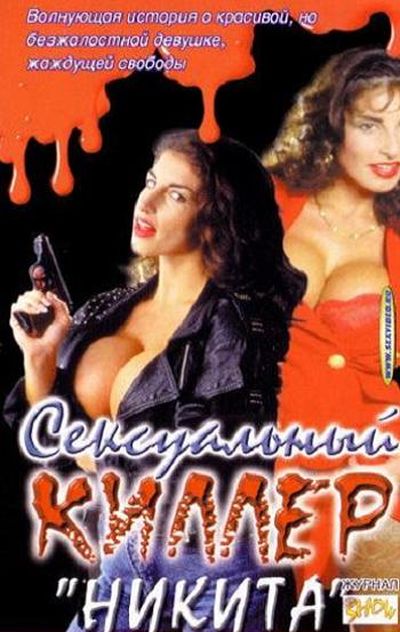
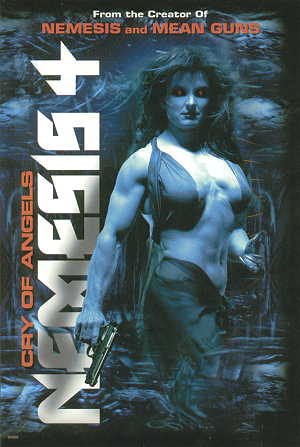 Though the lead actress, body-builder Sue Price, looks nothing like the cover pic (right), credit is due for choosing someone who defies conventional standards of female beauty. However, take all the points away, and then some, for pretending she does; having her spend half the film naked is something both Chris and I could very easily have lived without. She is, frankly, scary. That’s a shame, as while the budget here was obviously tiny, it’s put (mostly) to good use, with an interesting script.
Though the lead actress, body-builder Sue Price, looks nothing like the cover pic (right), credit is due for choosing someone who defies conventional standards of female beauty. However, take all the points away, and then some, for pretending she does; having her spend half the film naked is something both Chris and I could very easily have lived without. She is, frankly, scary. That’s a shame, as while the budget here was obviously tiny, it’s put (mostly) to good use, with an interesting script.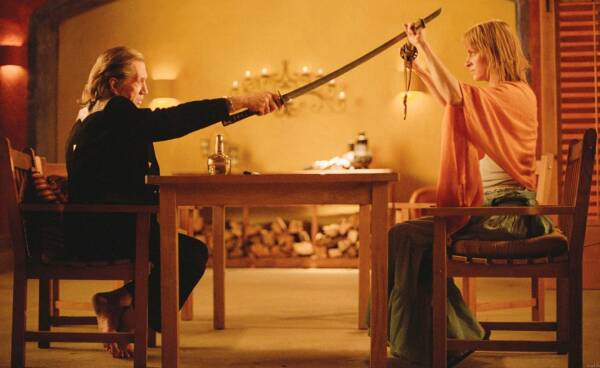 ★★★★
★★★★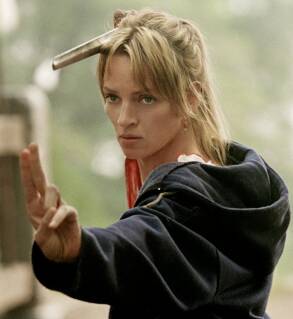 Precisely what, I’ll get to in a minute. But I also have to say that when this film works, it does so extremely well, with moments – and a good number of more lengthy sequences – that are just about perfect. We learn why Elle Driver (Hannah) has only one eye; the relationship between Budd (Madsen) and Bill (Carradine); the reason the Bride quit her life as an international jet-setting killer; and how the Crazy 88’s didn’t actually have 88 members. All these elements are dealt with swiftly and efficiently, plugged in like jigsaw pieces in their correct place, so it’s not as if Tarantino
Precisely what, I’ll get to in a minute. But I also have to say that when this film works, it does so extremely well, with moments – and a good number of more lengthy sequences – that are just about perfect. We learn why Elle Driver (Hannah) has only one eye; the relationship between Budd (Madsen) and Bill (Carradine); the reason the Bride quit her life as an international jet-setting killer; and how the Crazy 88’s didn’t actually have 88 members. All these elements are dealt with swiftly and efficiently, plugged in like jigsaw pieces in their correct place, so it’s not as if Tarantino  But when Tarantino just nods to other movies, rather than waving them in the air and shouting “Look at me! Amn’t I
But when Tarantino just nods to other movies, rather than waving them in the air and shouting “Look at me! Amn’t I 










